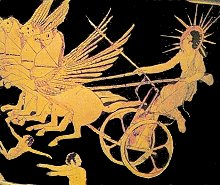Getting Deep About Co-Creating Your Destiny
Not that it’s a new concept or anything, but the law of attraction seems to be gaining more widespread notice lately. There’s an entertaining and interesting examination of this law in a recently released documentary called The Secret. Philosophers, artists, theologians, new age mystics, physicists, and psychologists are interviewed about their scientific observations as well as their personal experiences with “creating reality.” In The Secret, there are some cross-over concepts as well as two guys from What the BLEEP Do We Know!?, another entertaining film that seeks to examine questions found in both science and religion about the nature of our Universe and reality. According the film’s website: “Originally released in February 2004…What the BLEEP Do We Know!? went on to become the fifth highest grossing documentary in the United States, with ticket sales of $12 Million.”
The other day, I went to a luncheon where the speaker talked about using the law to attract the clients she wants. She is a marketing consultant who went out on her own after quitting a stressful six-figure corporate job. She dreamed up a way to make the same money while working out of her home. Her calculations showed that if she charged x and got y number of clients, she would be able to maintain her income. She got the clients alright, but what she didn’t expect to get were such difficult clients. By carefully using the law of attraction in a deliberate way, she asked for a way to redo the set up. She attracted a client who bought her database and then she started over. She specifically asked for/prayed for/outlined the kind of client she wanted and what she wanted to earn. Then she attracted it successfully. She asked and it was given to her.
Like I said earlier, this law of attraction is not a new concept. Napoleon Hill wrote about it in the 1930s in Think and Grow Rich. James Allen (1864-1912), covered the topic in his classic, As a Man Thinketh. Even Jesus apparently talked about it: “Ask, and it shall be given you; seek, and ye shall find; knock, and it shall be opened unto you.” – Matthew 7:7.
If I really wanted to do a deep study of this, I know that I could find references in other cultures besides the West. Even though I comparatively know very little about Hinduism and Buddha, I do know that in the East, the law of attraction goes by the name of Karma. Karma is very similar to the familiar the West’s version… “you reap what you sow” and “an eye for an eye”. The main difference is that Karma states that past actions with present causal effects can span back into past lifetimes as well as the current one.
So, you see, this isn’t a new concept at all – not even to me. I’ve used the law deliberately ever since reading about “creating reality” while in college. Once I even used it to manifest a parking space when running late for a class. I pictured the spot before reaching campus, and, viola, there it was waiting for me when I arrived!
The law of thought and attraction, of creating reality, is one of the laws of physics… like the law of gravity. As more of us gain an understanding of the laws of energy, the law of thought and attraction starts to make more sense. However, even though this law of physics exists, I question that merely thinking something true is all there is to it. Why not consider the possibility that the law of attraction can work in tandem with purpose and destiny? Although attitude has much to do with our level of empowerment, why should we rule out the concept that we are not the ones wholly in charge of this life we’re living? The concept of creating our reality through controlling our attitudes and throwing the weight of our free will around can easily lead to the conclusion that we, alone, create our material wealth and direct our life’s experiences…that, perhaps, there’s no destiny involved in our lives. I’m not talking about God being totally in charge or something, either. I’m talking about co-creating our lives.
Typical of the human psyche, which tends to look on the surface of things, we often end up latching on to the extremes of an idea rather than deeply exploring how it really affects the eternal journey. Since we tend to be so linear, when we discover, or should I say re-discover, something, we end up calling it evolution. “With this new scientific breakthrough, mankind has evolved yet again”, we proclaim. Of course, this is not some new scientific knowledge, and it’s only evolution when we use it to get to the truth rather than use it to create one more illusory human paradigm. I’ve observed that the majority of us tend to live in one archetype or another. One is to acknowledge that there is a “Greater Power” at work in our lives, giving it a name like The Father or The Mother or God or Ra or Zeus… or whatever, and then we delude ourselves into thinking that we’re letting this greater power call all the shots. Some of us abdicate responsibility altogether, calling it luck or thinking we’re deserving or non-deserving of a deity’s blessings. The other archetype comes across like we’re a bunch of children playing a new game – we get all excited about our “newfound” personal power and forget that there might be a destiny we signed up for before coming to this playground. Not that there’s anything wrong with having fun, but, for some, this new excitement over the law of attraction can lead to self-worship. Here’s a thought: Why don’t we consider getting out of the whole worship business altogether? And why do we tend to mystify and deify the things we don’t understand anyway?
 Look at how the ancient Greeks believed the Sun God, Helios beat it across the sky in a chariot while chasing down the Moon everyday. They also believed in the extreme concept that Fate or Destiny is an irreversible force in the Universe. They thought that try as man might, he cannot escape his destiny. In the most famous of Greek tragedies, an oracle (fortune-teller) foretold that Oedipus would kill his father and marry his mother. He did so, in spite of his parents’ efforts to prevent the horrifying events from occurring.
Look at how the ancient Greeks believed the Sun God, Helios beat it across the sky in a chariot while chasing down the Moon everyday. They also believed in the extreme concept that Fate or Destiny is an irreversible force in the Universe. They thought that try as man might, he cannot escape his destiny. In the most famous of Greek tragedies, an oracle (fortune-teller) foretold that Oedipus would kill his father and marry his mother. He did so, in spite of his parents’ efforts to prevent the horrifying events from occurring.
Then there’s the Judeo-Christian story of Christ. Man falls from grace in the Garden, the prophets and scriptures predict a savior will come to redeem man from that fall, and then, as many believe, Jesus comes to fulfill that prophecy.
The ancients knew that there is an overall plan in our lives. Things will play out, as they are preordained, no matter what. The actions of the Pharisees to suppress Jesus’ power actually served to fulfill their very own prophesy, and, as the story goes, Oedipus’ parents were powerless to stop his fate.
Okay, so all this makes for good drama, but what about bringing in some balance here? If I say we don’t have to embrace the extremes, if I say we can live a more balanced approach of inspired self-empowerment, then, of course, the self-worshippers can always turn around and tell me, “That’s our point – you can do what you want. If that’s your bliss, Darlin’, go for it!”
But, why not consider this for a moment? What if we all do have a divine contract* we make before we are born about what our life will generally be like, about what experiences and overall events we will have, and about what our relationships will be and with whom? Whether you choose to believe that you help write the contract or that the Divine hands it to you does not matter. Both paradigms have some truth in them! The point is that you are set up for the life you will lead, and you are given free will. You co-create your life… your destiny. When you reach the inevitable forks in your life’s path, the choices you make in attitude and thought will help you create the ultimate reality you live. Will you choose the hard or the easy road? Know that the lessons will be put in your way whether you want them or not—and all because you agreed to have them!
“My will shall shape my future. Whether I fail or succeed shall be no man’s doing but my own. I am the force; I can clear any obstacle before me or I can be lost in the maze. My choice; my responsibility; win or lose, only I hold the key to my destiny.” –Elaine Maxwell
* For further thought-provoking concepts about divine contracts, refer to Caroline Myss’ book, Sacred Contracts.



